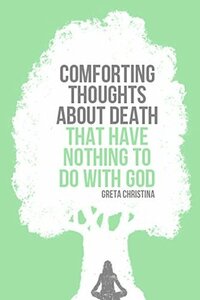Take a photo of a barcode or cover
reflective
challenging
reflective
fast-paced
I found the "comforting thoughts" quite helpful and relevant when I read this three months after my Mom died - ideas such as how death gives us a "deadline" so to speak - that without us having limited time on Earth most of us probably wouldn't accomplish much. But there was more about God than I wanted....I guess the author felt like they had to reference the religious comments people often make after death [and people did say them to me too - "she's in a better place now," etc) as a counterpoint to the thoughts the author was positing, but I would have preferred they just focus on the merits of their own arguments and not try to disprove anyone else.
Interesting. Nothing very life-changing, but I did highlight a few passages that were helpful and nice. One big "meh" from me, all-in-all.
Admittedly, I never really think about WHY I'm an atheist or how it comforts me. It just makes sense to me, so the majority of the essays about how atheism can be more comforting than religon were interesting, but repetitive for me. There were some interesting points, and of course, pointed out some of the hypocrisies and double-think that proselytizing Christians push (very evident in the current national situation), but over-all not a re-read and not really a comfort if I was deal with grief.
I love Greta Christina, and this little book is as great as you'd expect her work to be. Because it's composed of a number of essays that appeared separately, there's a lot of repetition in phrasing that got on my nerves, but I think I'm just being picky. It makes perfect sense for one paragraph of an essay/post/whatever to cover ideas in a very similar was as another piece by the same author on the same topic, but when they're all brought together in one place, it can feel strange. Some great tidbits in this very short collection, and I think it would have the biggest impact on someone who hasn't thought all that much about atheism, or who might be on the fence.
I found the execution and writing style rather poor, but the main ideas good.
Some folk have it worse than you do, that is undoubtedly a fact. Is it comforting to remind yourself of this when you're down?
Maybe that's the issue I had with this book, Yes! a lot of thoughts were based upon reality, but are they truly comforting? I don't know... Maybe someone finds comfort in them, maybe I'm just not so easily comforted, Maybe it's just as Woody Allen put it: Whatever Works!
Maybe that's the issue I had with this book, Yes! a lot of thoughts were based upon reality, but are they truly comforting? I don't know... Maybe someone finds comfort in them, maybe I'm just not so easily comforted, Maybe it's just as Woody Allen put it: Whatever Works!
Wonderfully reassuring. Much of the thoughts she discussed are ones I already believed or had considered, but it sounded SO good to hear it echoed back right now and hear another perspective just after my father's death and just when I have been hearing way too many religious platitudes that only upset me. I bought the audible book to listen to but will also buy the Kindle version to read again. The believers already have their own books and beliefs that bring little to no comfort to anyone who doesn't also believe, so this book is more for non-believers seeking comfort, and I found it to do just that.
I've been reading Greta Christina's blog for some while, but this is the first time I've read anything longer by her. It's only a short book - just over 60 pages - but written with clarity and passion. In it Christina makes a convincing case that atheists and humanists have good reason to face death with courage, and indeed do so, as her own experience shows. Not surprisingly there's a bias towards countering the particular difficulties non-believers face in the States. This means the arguments against the claim religion is uniquely placed to provide comfort to those facing, or dealing with the aftermath of, death consume a large proportion of the book. I'd have like to have read more about the ways atheists and humanists do find comfort, but there are sources of further reading at the end of the book.




